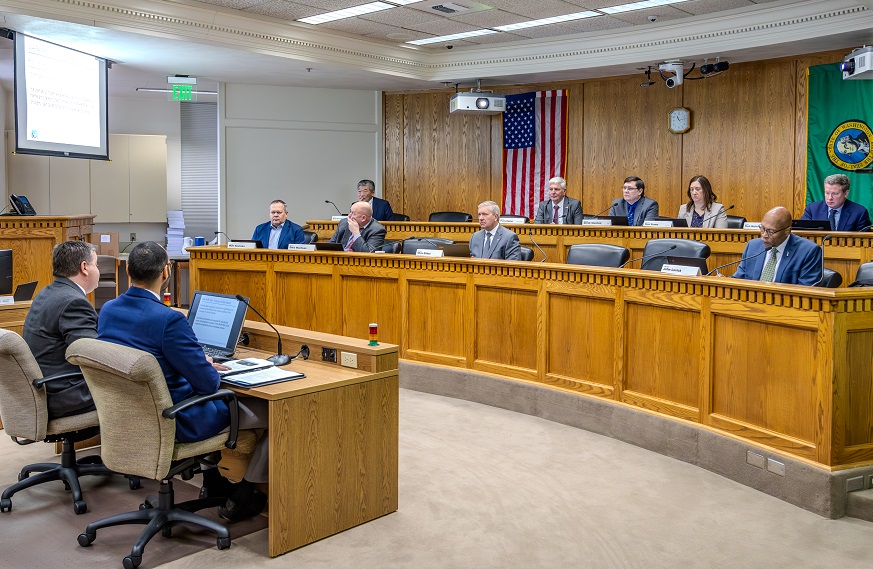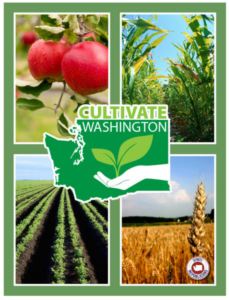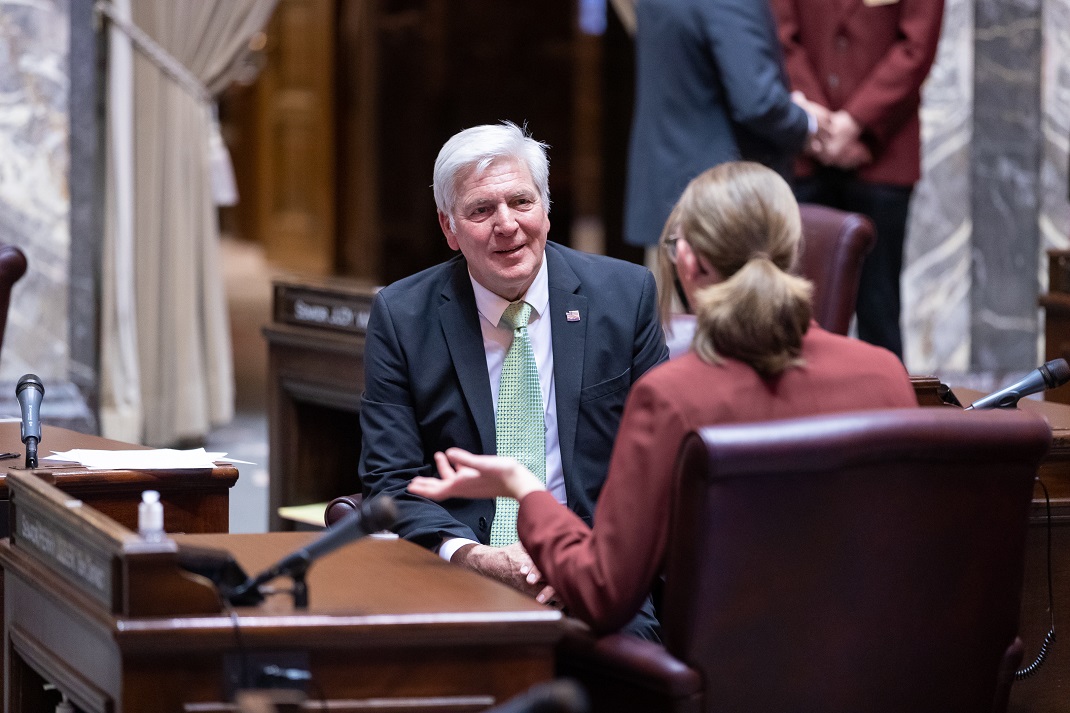Dear Neighbor,
Greetings from the state Capitol!
Even though the “interim” period between legislative sessions won’t officially be over until January 8, when the 2024 session begins, it unofficially ended for me with the Thanksgiving holiday (I hope yours was a happy one). Between an all-day Senate Republican meeting on Tuesday and the Senate’s “Assembly Days” in Olympia yesterday and the day before, more of this week went to legislative business than not.

I’m Republican leader on the Senate Business, Financial Services, Gaming and Trade Committee, which met yesterday to talk about home equity agreements, lending rules, the “creative economy,” state contracting and more.
As of Monday we can begin filing legislation. I haven’t decided whether to put any bills in the hopper during the prefiling period, but if I do, my Senate colleagues will have until the session’s first day to decide whether they want to sign on as co-sponsors. I’ll also have time to look at what others have filed and decide whether I will eventually want to add my name to the sponsor list. Either way, the bills I introduced during our 2023 session are also still in play for 2024. That list can be seen here.
Here are some other updates since my September report to you.
Agriculture needs our support; ‘Cultivate Washington’ would deliver
Between labor costs, fuel costs, uncertainties about water availability, the state’s management of predators, and more, it’s no wonder agricultural operations in our state are closing at a rate we’ve never seen.
Republicans serve the legislative districts where most of Washington’s farmers, growers and ranchers do business, so it’s appropriate that a group of Senate Republicans recently stepped forward with an agenda for supporting agriculture in our state. We call it “Cultivate Washington,” and spent 40 minutes sharing it with well over a dozen news reporters back on November 14. A link to the news conference is here, and more information is on our Cultivate Washington webpage.
Legislators can do much to improve the business climate for Washington agriculture. We look forward to advocating for our agenda during the 2024 legislative session.
New issues with cap-and-trade law confirm need for reforms
In October I alerted the news media about a letter I’d sent to the director of the state Department of Ecology, expressing my concern about a lack of transparency in the cap-and-trade program her agency administers. You and I deserve to know who is buying the carbon-emission “allowances” the state is selling at ever-increasing prices, and in my view the Climate Commitment Act (the cap-and-trade law’s formal name) requires Ecology to disclose that information in a way that isn’t happening. My concern is detailed here in what I sent to the press; it contains a link to the letter.
Word of my interaction with Ecology traveled down the Columbia to Goldendale and Delmer Eldred, host of “The Klickitat Voice” podcast. He invited me on for a discussion about the Climate Commitment Act that lasted most of a half-hour and also covered the CCA fuel-surcharge issue that is hurting Washington’s agricultural sector. I invite you to listen to it here.
The Ecology director’s response to my letter was not encouraging but also not unexpected. I haven’t decided what my next move will be, but there’s still time to decide, as this is not the only reform the Climate Commitment Act needs.
In the meantime, Ecology’s director also wants to pursue linking Washington’s carbon policies to those of California and the Canadian province of Québec, claiming it will create a “successful, stable carbon market” – but I’m not hearing her explain how that will ease the pain on Washington drivers’ wallets.
My interest in reforming the Climate Commitment Act is shared in this recent newspaper editorial that also mentions a citizen initiative filed to repeal the law. The initiative will come before the Legislature if enough signatures are verified.
I don’t endorse all of the newspaper’s reform ideas but I do look forward to being able to debate the CCA in a way we could not in 2021, when the public was literally barred from the Capitol and legislators were forced to meet remotely. It also will be a more informed debate, because we know from the past year what the carbon law means at the pump and in the marketplace. That’s a big change from three years ago, when the discussion was mostly limited to speculation about what the law would mean.
K-12: Let’s discuss transparency and responsibilities
Speaking of debates, I encourage you to read this opinion piece from Sen. Brad Hawkins, Republican leader on our Senate Early Learning and K-12 Education Committee. In responding to a newspaper editorial about school funding, he thoughtfully lays out the need to have a conversation about how “education” is defined. His argument includes this observation:
“Frankly, it is becoming increasingly difficult to differentiate where school responsibilities end and where family and community responsibilities begin. This approach only prompts philosophical debate and encourages more parents to pull their children from public schools, which they have been doing in high numbers.”
Enrollment in Washington’s public K-12 schools is down 42,000 students from the pre-pandemic level. While that can likely be attributed to the shortcomings of remote instruction or, as Senator Hawkins notes, the frustrating blurring of responsibilities, it doesn’t help if schools are less than transparent about how and what children are being taught.
Teens, apply now to serve as a page for the Senate
The term “page” isn’t heard much these days outside of parliamentary systems… or libraries. It may be an old-fashioned term for someone who serves as a courier or messenger – but then again, our Legislature’s page programs do date to 1891, just two years after statehood.
One of the most enjoyable parts of being a senator is sponsoring students as Senate pages during the legislative session. These teens serve for one week, receiving an unmatched civics education while meeting others their age (14-16 years old) from around the state – and receiving a paycheck as well! Each senator is allowed to sponsor a certain number of pages; I will have the privilege of sponsoring up to six students during the 2024 session, which begins January 8 and ends March 7.
Click here to learn more about the Senate page program, including how to apply; this video shows what it’s like. If you know teens who would be interested, they may also contact Myra Hernandez, Civic Education Director (Myra.Hernandez@leg.wa.gov or SenatePageProgram@leg.wa.gov) or my office.
Because I always seem to learn something from them, I visit as much as possible with the students I sponsor as Senate pages — even during breaks in our work in the Senate chamber.
***
I am working to make living in our state more affordable, make our communities safer, uphold our paramount duty to provide for schools, and hold state government accountable. I’ll work with anyone who shares those goals and wants to find solutions.
Please reach out to my office with your thoughts, ideas and concerns on matters of importance to you. If you don’t already, also consider following me on Facebook. I am here to serve and look forward to hearing from you.










